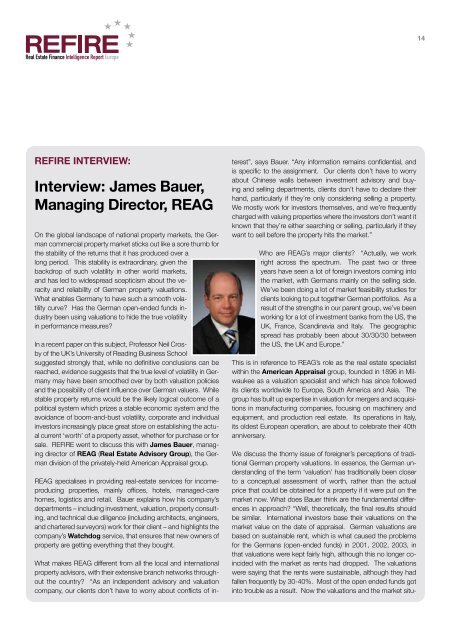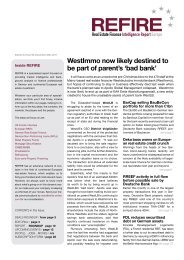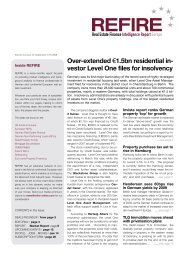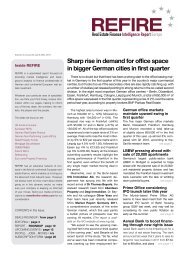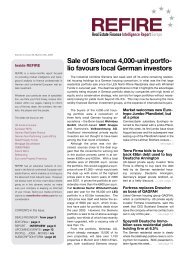Interview: James Bauer, Managing Director, REAG - Five reasons to ...
Interview: James Bauer, Managing Director, REAG - Five reasons to ...
Interview: James Bauer, Managing Director, REAG - Five reasons to ...
You also want an ePaper? Increase the reach of your titles
YUMPU automatically turns print PDFs into web optimized ePapers that Google loves.
REFIRE INTERVIEW:<br />
<strong>Interview</strong>: <strong>James</strong> <strong>Bauer</strong>,<br />
<strong>Managing</strong> <strong>Direc<strong>to</strong>r</strong>, <strong>REAG</strong><br />
On the global landscape of national property markets, the German<br />
commercial property market sticks out like a sore thumb for<br />
the stability of the returns that it has produced over a<br />
long period. This stability is extraordinary, given the<br />
backdrop of such volatility in other world markets,<br />
and has led <strong>to</strong> widespread scepticism about the veracity<br />
and reliability of German property valuations.<br />
What enables Germany <strong>to</strong> have such a smooth volatility<br />
curve? Has the German open-ended funds industry<br />
been using valuations <strong>to</strong> hide the true volatility<br />
in performance measures?<br />
In a recent paper on this subject, Professor Neil Crosby<br />
of the UK’s University of Reading Business School<br />
suggested strongly that, while no definitive conclusions can be<br />
reached, evidence suggests that the true level of volatility in Germany<br />
may have been smoothed over by both valuation policies<br />
and the possibility of client influence over German valuers. While<br />
stable property returns would be the likely logical outcome of a<br />
political system which prizes a stable economic system and the<br />
avoidance of boom-and-bust volatility, corporate and individual<br />
inves<strong>to</strong>rs increasingly place great s<strong>to</strong>re on establishing the actual<br />
current ‘worth’ of a property asset, whether for purchase or for<br />
sale. REFIRE went <strong>to</strong> discuss this with <strong>James</strong> <strong>Bauer</strong>, managing<br />
direc<strong>to</strong>r of <strong>REAG</strong> (Real Estate Advisory Group), the German<br />
division of the privately-held American Appraisal group.<br />
<strong>REAG</strong> specialises in providing real-estate services for incomeproducing<br />
properties, mainly offices, hotels, managed-care<br />
homes, logistics and retail. <strong>Bauer</strong> explains how his company’s<br />
departments – including investment, valuation, property consulting,<br />
and technical due diligence (including architects, engineers,<br />
and chartered surveyors) work for their client – and highlights the<br />
company’s Watchdog service, that ensures that new owners of<br />
property are getting everything that they bought.<br />
What makes <strong>REAG</strong> different from all the local and international<br />
property advisors, with their extensive branch networks throughout<br />
the country? “As an independent advisory and valuation<br />
company, our clients don’t have <strong>to</strong> worry about conflicts of in-<br />
terest”, says <strong>Bauer</strong>. “Any information remains confidential, and<br />
is specific <strong>to</strong> the assignment. Our clients don’t have <strong>to</strong> worry<br />
about Chinese walls between investment advisory and buying<br />
and selling departments, clients don’t have <strong>to</strong> declare their<br />
hand, particularly if they’re only considering selling a property.<br />
We mostly work for inves<strong>to</strong>rs themselves, and we’re frequently<br />
charged with valuing properties where the inves<strong>to</strong>rs don’t want it<br />
known that they’re either searching or selling, particularly if they<br />
want <strong>to</strong> sell before the property hits the market.”<br />
Who are <strong>REAG</strong>’s major clients? “Actually, we work<br />
right across the spectrum. The past two or three<br />
years have seen a lot of foreign inves<strong>to</strong>rs coming in<strong>to</strong><br />
the market, with Germans mainly on the selling side.<br />
We’ve been doing a lot of market feasibility studies for<br />
clients looking <strong>to</strong> put <strong>to</strong>gether German portfolios. As a<br />
result of the strengths in our parent group, we’ve been<br />
working for a lot of investment banks from the US, the<br />
UK, France, Scandinavia and Italy. The geographic<br />
spread has probably been about 30/30/30 between<br />
the US, the UK and Europe.”<br />
This is in reference <strong>to</strong> <strong>REAG</strong>’s role as the real estate specialist<br />
within the American Appraisal group, founded in 1896 in Milwaukee<br />
as a valuation specialist and which has since followed<br />
its clients worldwide <strong>to</strong> Europe, South America and Asia. The<br />
group has built up expertise in valuation for mergers and acquisitions<br />
in manufacturing companies, focusing on machinery and<br />
equipment, and production real estate. Its operations in Italy,<br />
its oldest European operation, are about <strong>to</strong> celebrate their 40th<br />
anniversary.<br />
We discuss the thorny issue of foreigner’s perceptions of traditional<br />
German property valuations. In essence, the German understanding<br />
of the term ‘valuation’ has traditionally been closer<br />
<strong>to</strong> a conceptual assessment of worth, rather than the actual<br />
price that could be obtained for a property if it were put on the<br />
market now. What does <strong>Bauer</strong> think are the fundamental differences<br />
in approach? “Well, theoretically, the final results should<br />
be similar. International inves<strong>to</strong>rs base their valuations on the<br />
market value on the date of appraisal. German valuations are<br />
based on sustainable rent, which is what caused the problems<br />
for the Germans (open-ended funds) in 2001, 2002, 2003, in<br />
that valuations were kept fairly high, although this no longer coincided<br />
with the market as rents had dropped. The valuations<br />
were saying that the rents were sustainable, although they had<br />
fallen frequently by 30-40%. Most of the open ended funds got<br />
in<strong>to</strong> trouble as a result. Now the valuations and the market situ-<br />
14


